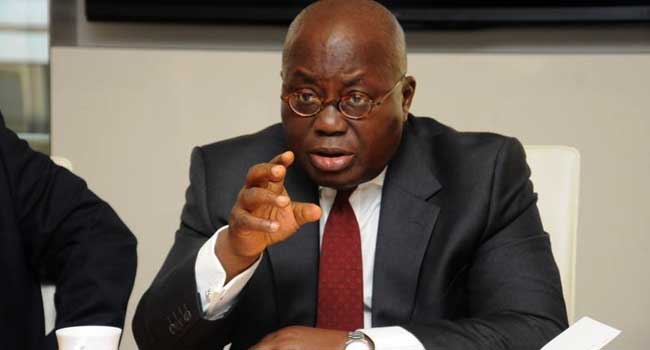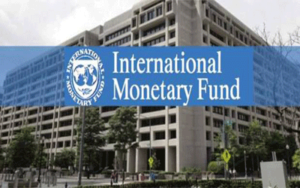
The International Monetary Fund’s executive board has approved a long-awaited $3 billion bailout for Ghana in hopes of combating the country’s economic crisis.
The arrangement will allow for the immediate release of $600 million, with the remaining funds to be made available over the course of the next three years, the IMF said in a statement Wednesday.
Facing soaring inflation, high debt and a weakening currency, Ghana’s government began negotiations with the IMF last July for a bailout package. In December, the IMF agreed after a two-week visit to the West African country.

The IMF funds should help Ghana emerge from a financial crisis exacerbated by the COVID-19 pandemic but will require changes to the country’s tax system and public spending.
“The combination of large external shocks and preexisting fiscal and debt vulnerabilities precipitated a deep economic and financial crisis in Ghana,” IMF Managing Director Kristalina Georgieva said in a statement.
The government has launched changes that will “focus on reining in inflation and rebuilding foreign reserve buffers,” she added.
Inflation in Ghana reached 41.2% in April, falling from a more than 20-year high of 54.1% in December, but still well above the central bank’s target of 6% to 10%, according to Trading Economics, which provides global economic information.
Georgieva said the Bank of Ghana, the country’s central bank, will keep raising interest rates to combat inflation, stop financing the government’s budget and allow a flexible exchange rate, among other steps.
Securing additional debt restructuring agreements with external creditors will be key to ensuring Ghana’s debt bailout plan succeeds, the IMF statement said.




vibracion de motor
Aparatos de ajuste: esencial para el desempeño uniforme y eficiente de las dispositivos.
En el mundo de la tecnología actual, donde la eficiencia y la seguridad del equipo son de suma trascendencia, los dispositivos de equilibrado tienen un rol vital. Estos dispositivos dedicados están creados para equilibrar y regular piezas móviles, ya sea en dispositivos manufacturera, medios de transporte de desplazamiento o incluso en aparatos hogareños.
Para los especialistas en mantenimiento de aparatos y los profesionales, manejar con sistemas de balanceo es importante para garantizar el operación estable y fiable de cualquier aparato giratorio. Gracias a estas alternativas avanzadas modernas, es posible disminuir notablemente las vibraciones, el zumbido y la esfuerzo sobre los cojinetes, mejorando la longevidad de elementos costosos.
También importante es el tarea que tienen los sistemas de equilibrado en la atención al usuario. El asistencia profesional y el mantenimiento regular utilizando estos sistemas posibilitan brindar asistencias de óptima nivel, elevando la contento de los usuarios.
Para los propietarios de emprendimientos, la aporte en equipos de equilibrado y detectores puede ser fundamental para mejorar la efectividad y productividad de sus dispositivos. Esto es especialmente significativo para los dueños de negocios que dirigen medianas y modestas empresas, donde cada detalle cuenta.
También, los equipos de calibración tienen una extensa aplicación en el campo de la prevención y el monitoreo de excelencia. Permiten encontrar potenciales defectos, evitando reparaciones onerosas y problemas a los aparatos. Además, los información obtenidos de estos equipos pueden usarse para perfeccionar procedimientos y mejorar la reconocimiento en buscadores de investigación.
Las campos de implementación de los equipos de ajuste cubren numerosas sectores, desde la producción de vehículos de dos ruedas hasta el control del medio ambiente. No interesa si se considera de importantes elaboraciones productivas o limitados establecimientos domésticos, los equipos de calibración son necesarios para garantizar un funcionamiento óptimo y libre de fallos.
Профессиональный сервисный центр по ремонту бытовой техники с выездом на дом.
Мы предлагаем:сервисные центры в москве
Наши мастера оперативно устранят неисправности вашего устройства в сервисе или с выездом на дом!
Профессиональный сервисный центр по ремонту техники в Казани.
Мы предлагаем: Сколько стоит отремонтировать принтер Develop
Наши мастера оперативно устранят неисправности вашего устройства в сервисе или с выездом на дом!
Предлагаем услуги профессиональных инженеров офицальной мастерской.
Еслли вы искали ремонт холодильников gorenje, можете посмотреть на сайте: срочный ремонт холодильников gorenje
Наши мастера оперативно устранят неисправности вашего устройства в сервисе или с выездом на дом!
Знаю отличный многофункциональный ресурс для людей, которые ценят своё время!
Особенно полезна категория: Строительство
Здесь есть всё: от познавательных статей до практических калькуляторов и доски объявлений. Один сайт заменяет множество других!
Присоединился к интересному сообществу на многотематическом портале!
Активно изучаю материалы статьи: 15 лучших масел для двигателя и редуктора мотоблока — долговечность техники
Отличное место для обмена опытом, поиска полезной информации и использования различных онлайн-инструментов. Присоединяйтесь!
Профессиональный сервисный центр по ремонту техники.
Мы предлагаем: Ремонт сушильных машин Samsung в Новосибирске
Наши мастера оперативно устранят неисправности вашего устройства в сервисе или с выездом на дом!